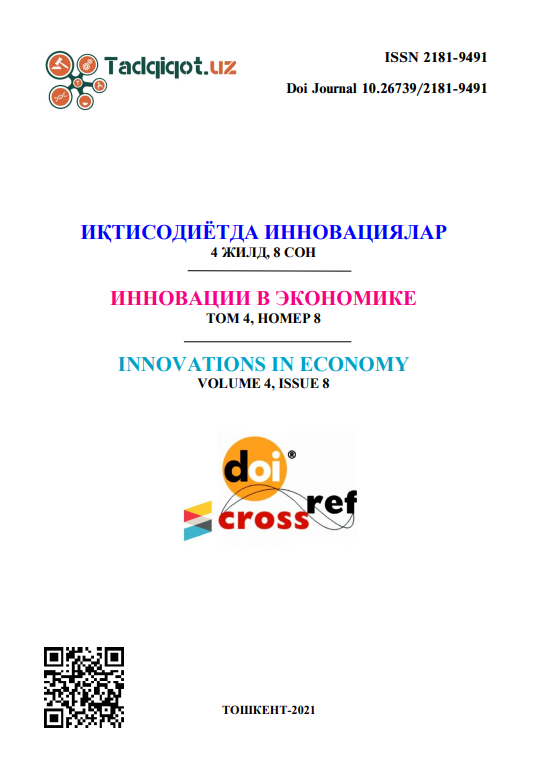ИННОВАЦИИ В ПРОГРАММАХ ОБУЧЕНИЯ И РАЗВИТИЯ КАДРОВ В БАНКАХ УЗБЕКСИТАНА
Ключевые слова:
управление человеческими ресурсами, обучение и развитие кадров, межличностные навыки, технические навыки, коммуникативные навыки, эмоциональный интеллект, тайм-менеджмент, командная работа, банки.Аннотация
В последнее время важность обучения и развития кадров как часть управления человеческими ресурсами значительно возросла. Многие компании согласны с тем, что обучение и развитие кадров являются основополагающими для цикла совершенствования организации и успеха. С другой стороны, влиянию обучения и развития кадров уделяется меньше внимания в странах Центральной Азии.
Многие компании в Узбекистане уделяют большое внимание профессиональным навыкам сотрудников во время тренингов и курсов повышения квалификации и упускают из виду важность межличностных навыков. В этой статье рассматривается важность межличностных навыков руководителей и служащих банка и предлагается больше сосредоточиться на межличностных навыках во время обучения и развития кадров, в том числе, как коммуникативные навыки, эмоциональный интеллект, тайм-менеджмент и командная работа.
Основная цель данного исследования - выявить изменения и нововведения, необходимые в курсах обучения и развития, которые проходят в банках Узбекистана. Этот документ будет иметь высокую ценность не только потому, что он предлагает новаторство в вышеупомянутых курсах, но также очень ценен для менеджеров по персоналу и сотрудникам, чтобы понять, на каких навыках персонала следует сосредоточить внимание. Подцели исследования включают:
- Понимание важности инноваций в курсах обучения и развития персонала в банках Узбекистана
- Изучение разницы между межличностными и техническими навыками
- Рекомендации менеджерам банка по переоценке учебных курсов персонала.
Библиографические ссылки
X.Z. Abduraxmonovich, J.B. Ibragimovich. Interdisciplinary Institute of Advanced Training and Retraining of Financial-Banking Staff under Tashkent Financial Institute. 2016 [Online] Available at: http://www.tfi.uz/index.php/faoliyat/uslub/malakaosh [Accessed 15 January 2019].
Katz, R.L., Skills of an Effective Administrator. Harvard Business Review. 1955.
Shen, J., International Training and Management Development: Theory and Reality: A Conceptu-al Study. Journal of Management Development, (24), pp.656-66. 2004.
McDowall, A. Saunders, UK Manager’s Conceptions of Training and Development. Journal of European Industrial Training, (34), pp.609-30. 2010.
Cole, G.A., Personnel and Human Resource Management Practice. 5th ed. 2002.
A.Infande, The Four Basic steps in the Training Process. Kindle Edition. 2015.
E.Engetou, THE IMPACT OF TRAINING AND DEVELOPMENT ON ORGANI-ZATIONAL PERFORMANCE. Case study: National Financial Credit Bank Kumba. Thesis. CENTRIA UNIVERSITY OF APPLIED SCIENCES. 2017.
Kirkpatric, D., Evaluation of Training, Training and Development handbook: A guide to Human Resource Development. 1st ed. New Yor: McGraw Hill Company. 1959.
P.Tayo, A.Olamigoke, Leadership Management and Challenges in a Globalized Economy. 1st ed. Institute of Business and Policy Development. 2006.
R.West, L.H.Turner, Understanding interpersonal communication. 2011.
L.A.Baxter, D.O.Braithwaite, Engaging theories in interpersona lcommunication: Multiple perspectives.. Thousand Oaks. 2008.
D.Goleman, Working with emotional intelligence. New York: Bantam Books. 1998.
H.Naeem, Emotional Intelligence and its impact on service quality- Empherical evidence from the pakistani Banking Sector. International Business & Economics Research Journal, pp.55-62. 2008.
M.Tsai, A study on the relationship between leadership style, Emotional Intelligence,self-efficcacy and organisational commitment : A case study of th banking Industry in Taiwan. African Journal of Business Management, pp.5319-29. 2011.
Beigi, M.S.M., Effects of an emotional intelligence training program on service quality of bank branches. Journal of Service theory and practice, 5(21), pp.552-56. 2011.
Kappagoda, S., Emotional Inteligence of the Managers in the Banking Sector in Srilanka. International Journal of Research in Commerce,IT and Management, pp.1-6. 2013.
Papaathanasiou, M.S.S., Emotional Intelligence and Job satisfaction in Greek Banking Sector. Research in Applied Economics, 1(6), pp.225-39. 2014.
Swarnalatha, V., A study on Emotional Intelligence among Bank Employees. International Journal of Engineering, Technology, Management and Applied Sciences, pp.201-05. 2016.
Ugoani, N.N., Emotional Intelligence and Sucessful Change Management in the Nigerian Banking Industry. Independent Journal of Management and Production, pp.335-61. 2017.
Adeyinka, A., EFFECTIVE TIME MANAGEMENT FOR HIGH PERFORMANCE IN AN ORGANIZATION. Thesis. Seinajoki University of Applied Sciencce. 2012.
P. Kotler, G. Armstrong, Principles of Marketing. 2012.
S. Khan, L.S. Al Mashikhi, Impact of Teamwork on Employees Performance. International Journal of Education and Social Science, 4(11), pp.15-16. 2017.
L.A.Kovács, M.F.Talpoş, Internet and Transdisciplinary Based Teamwork Formula for Elaborating a Bachelor‟s or a Master‟s Thesis. Innovations and Advances in Computing, Informatics, Systems Sciences, Networking and Engineering, pp.445-51. 2015.
J.E.Driskell, E.Salas, Human Factors. In Collective behavior and team performance. p.277–288. 1992.
A.A.Arulrajah, H.H.Opatha, „An Exploratory Study on the Personal Qualities/Characteristics expected by the Organizations for Key HRM jobs in Sri Lanka‟. Sri Lankan Journal of Human Resource Management, 1(3), pp.32-48. 2012.
A.Anuja, A.A.Arulrajah, Team Working Practices and Team Orientation of Employee: A Comparative Study between the State and Private Banks in Sri Lanka. Sri Lankan Journal of Human Resource Management, 1(4), p.51. 2013.
Pearson, K., On Further Methods of Determining Correlations. Dulau and Company. 2007.
Danquah, E., The effect of Emotional Intelligence on the Financial Performance of Commercial Banks in Ghana:The Medical role of Relationship Marketing, Service Quality, Customer Satisfaction. British Journal of Marketing Studies, pp.8-25. 2015.
Praveena, S., Emotional Intelligence and Job Performance of Bank Managers in Sri Lanka. OUSL Journal, pp.41-49. 2015.

